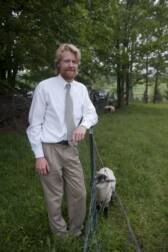Environmentalism is not a topic I’ve tackled here at Difficult Run, and it’s not something I write about a whole lot. That doesn’t mean that I don’t care, however. I just recognize that it’s way outside my area of expertise. I’m at once incredibly skeptical of most environmentalism that comes from a politically liberal mindset because I find it ideologically blind and totally impractical. But that doesn’t mean that I don’t care. I just don’t know what to do.
 The person I respect the most on this issue is Chris Fields-Johnson. Chris is a PhD student in crop soil & soil environmental science at Virginia Tech and is the founder of The Piedmont Earthworks. Chris knows his stuff, and he has spent years studying and honing his skills so that his passion is matched by his depth of expertise. When I want to talk about environmental policy without the politics and with someone who knows what they are talking about, I talk to Chris.
The person I respect the most on this issue is Chris Fields-Johnson. Chris is a PhD student in crop soil & soil environmental science at Virginia Tech and is the founder of The Piedmont Earthworks. Chris knows his stuff, and he has spent years studying and honing his skills so that his passion is matched by his depth of expertise. When I want to talk about environmental policy without the politics and with someone who knows what they are talking about, I talk to Chris.
Today he posted a fascinating and informative environmentalism piece discussing the environmental history of the southeast (especially Virginia) from the arrival of early European settlers to this day. The short version (although you should read the full article), is that a combination of beaver hunters and tobacco growers eviscerated the diverse ecosystems, and only the advent of widespread planting of loblolly pine prevented the total desertification of the region.
However, as Chris writes, the loblolly pines are not valuable enough as pulpwood to justify continued investment in the land, and so the degradation continues. Chris asks the question: what next? He suggests homesteading, as he is currently doing, to use the loblolly pines as a basis from which to begin reclaiming the original biodiversity of the region.
I’d like to hear more details about Chris’s suggestion, so I left a comment there. I’m turning comments off on this post so that if you have questions, you can ask them there as well.